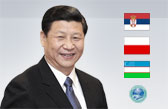Doha climate talks end with no consensus
(Xinhua) Updated: 2012-12-02 08:24DOHA - The first half of the Doha climate talks ended Saturday without achieving any major progress on the future of the Kyoto Protocol, which is the world's only legally binding climate treaty.
No breakthrough has been made during the first week on the extension of the Kyoto Protocol, a meaningful completion of the Ad Hoc Working Group on the Long-term Cooperative Action (LCA), or the funding issue, said Su Wei, China's chief climate negotiator and director-general of the Department of Climate Change of the National Development and Reform Commission.
"Parties' stands are not very clear at the initial stage of the negotiations," he said, adding that "We hope the ministerial meetings next week can lead to some consensus and solutions that can be accepted by all."
Up to now, developed countries are still reluctant to make further emission cuts pledge as urged by developing countries. The European Union (EU) has pledged to reduce its emissions by at least 20 percent by 2020, but set conditions for a further 30 percent cut.
The United States, despite President Barack Obama's pledge to lead in climate in his second term, is blocking progress towards a longer-term global deal; while Canada, Japan, New Zealand, among others, are still keeping away from the second commitment period of the Kyoto Protocol.
Parties also divide on the length of the second period. The EU and the BASIC countries, including China, India, Brazil and South Africa, propose it should be eight years as it could then be linked with the existing 2020 targets; while some small, developing island states prefer a five-year period so as to push developed countries to take faster actions.
"As the second period is to launch on January 1, 2013, we must reach some consensus on the issue as soon as possible," Su said.
Related special: 2012 UN Climate Change Conference







